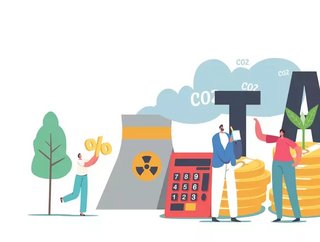Carbon tax will 'close gulf between promises and policies'

With less than a month to go until the UN Climate Change Conference (COP26), Molly Scott Cato, former Green MEP and now Professor of Economics at the University of Roehampton, says the world must implement a carbon tax to close the gulf between empty promises and policies to tackle the climate crisis.
“Greta Thunberg hit the nail on the head last week - the world must ‘mind the gap’ between the promises made by politicians and the policies they are introducing to deliver them," she said.
“Countries declaring their ambitions for CO2 reductions via Nationally Determined Contributions (NDCs) prevented the complete failure of previous COP talks focused on mandatory global agreements, but it has not resulted in pledges sufficient to keep the world within the 1.5 degrees warming limit.
“The world must start pulling powerful policy levers, the most important being a high and rising carbon tax. If businesses were facing a clear upward trajectory in the price of CO2 emissions they would have no choice but to undertake a rapid transition beyond the fossil era, turning the supertanker away from its collision course with the climate iceberg."
A carbon tax would feed through into all prices for goods and services, which is why it needs to be matched with a climate dividend, she added.
"This should be directed towards those on low incomes, and pay for programmes to reduce energy demand, such as free retrofit schemes and improved public transport. It could also be transferred to the countries bearing the brunt of the climate crisis without being responsible for causing it, such as the Philippines or Bangladesh.
“Heading into COP26, the ‘loss and damage’ agenda is the most serious potential stumbling-block in Glasgow. There remains an urgent need to transfer wealth to the countries of the Global South (Latin America, Asia, Africa, and Oceania) otherwise there is a distinct possibility that they will not support the negotiations or any political outcome.
“Indeed the NDC pledges by some of the world’s low-income countries are conditional on the richer countries meeting their pledges on climate finance. Ultimately, unless countries can meet their obligations to provide the $100bn they promised at Copenhagen and address the loss-and-damage agenda, COP26 will fail as a global agreement and simply become a coalition of the rich and powerful.”
But not everyone is convinced carbon taxes are the solution to global climate change.
Eric Toder, writing in the Tax Policy Center, said carbon taxes are porous. "Producers and consumers can avoid the tax by importing foreign goods with a high carbon content. And lower prices from reduced US carbon consumption could encourage more carbon consumption in other countries," he writes.
"The only real solution is similar to what will get us past the COVID-19 pandemic – public support for the development and deployment of new technologies ... the ultimate solution is lower prices for clean energy, not higher prices for energy from fossil fuels, even though the latter may be helpful at the margin for lowering prices of clean energy."
- Dow has announced plans to build the world's first net-zero carbon emissions integrated ethylene cracker and derivatives site with respect to scope 1 and 2 CO2 emissions. The project would more than triple Dow's ethylene and polyethylene capacity from its Fort Saskatchewan, Alberta site, while retrofitting the site's existing assets to net-zero carbon emissions.






